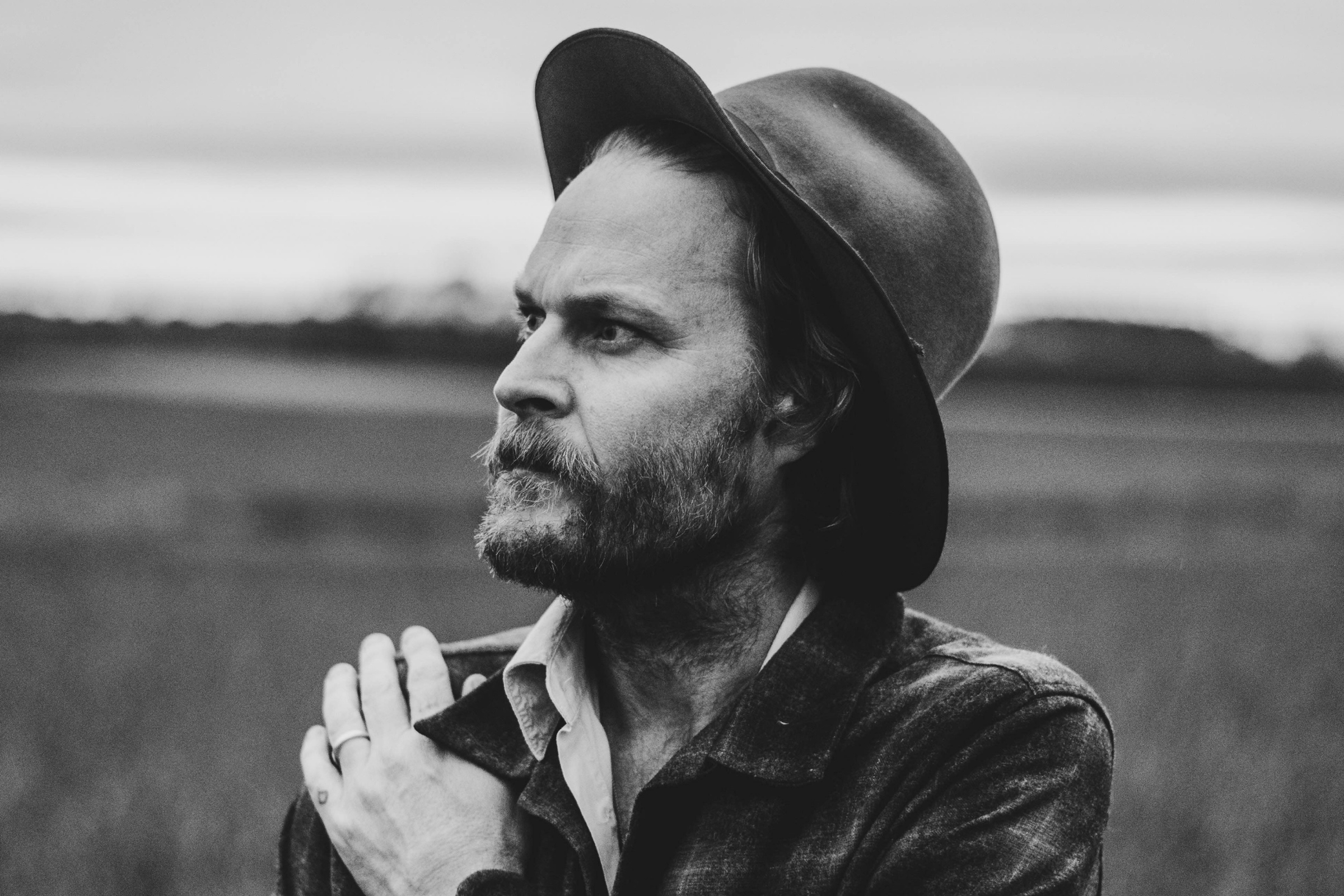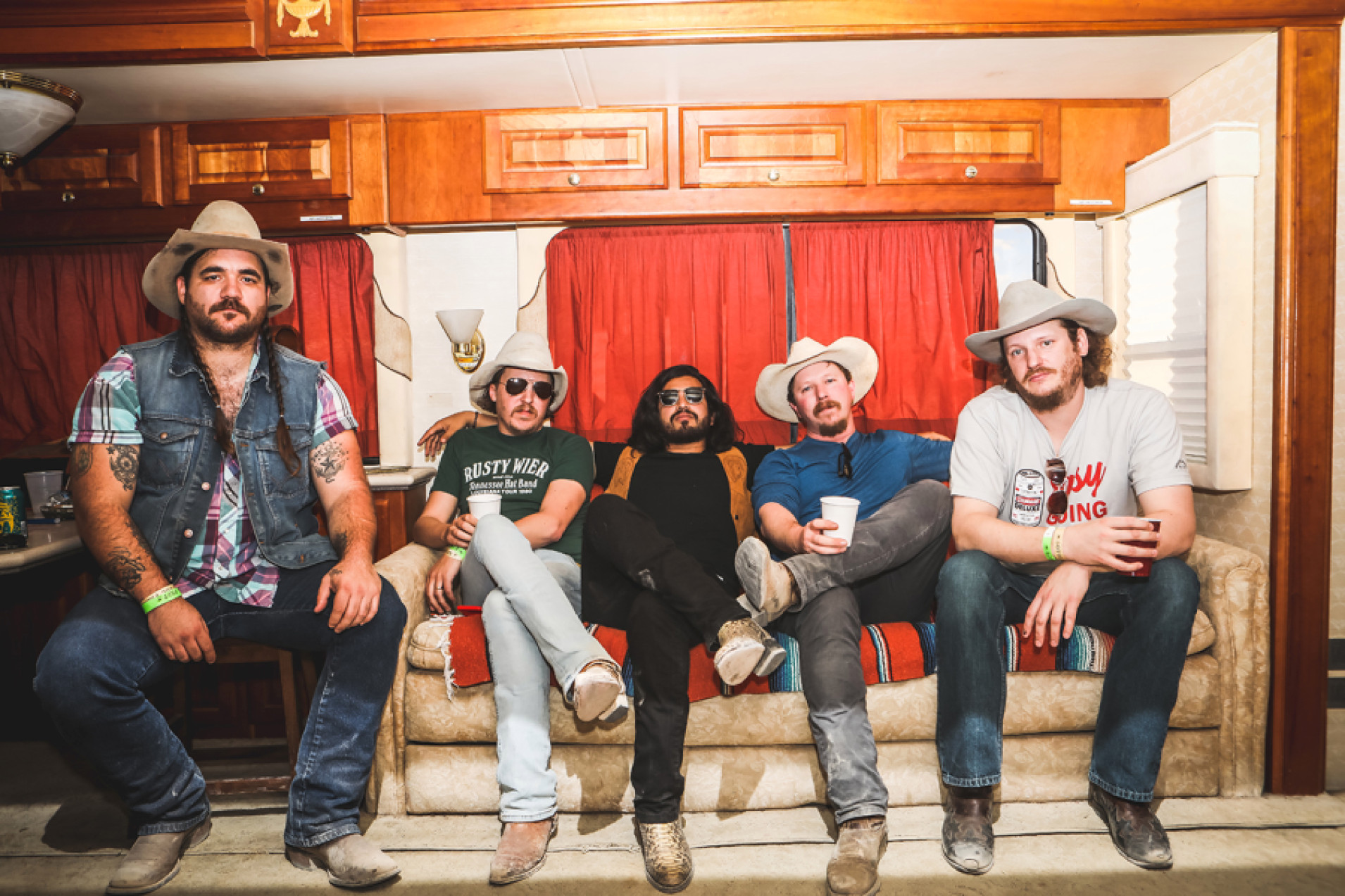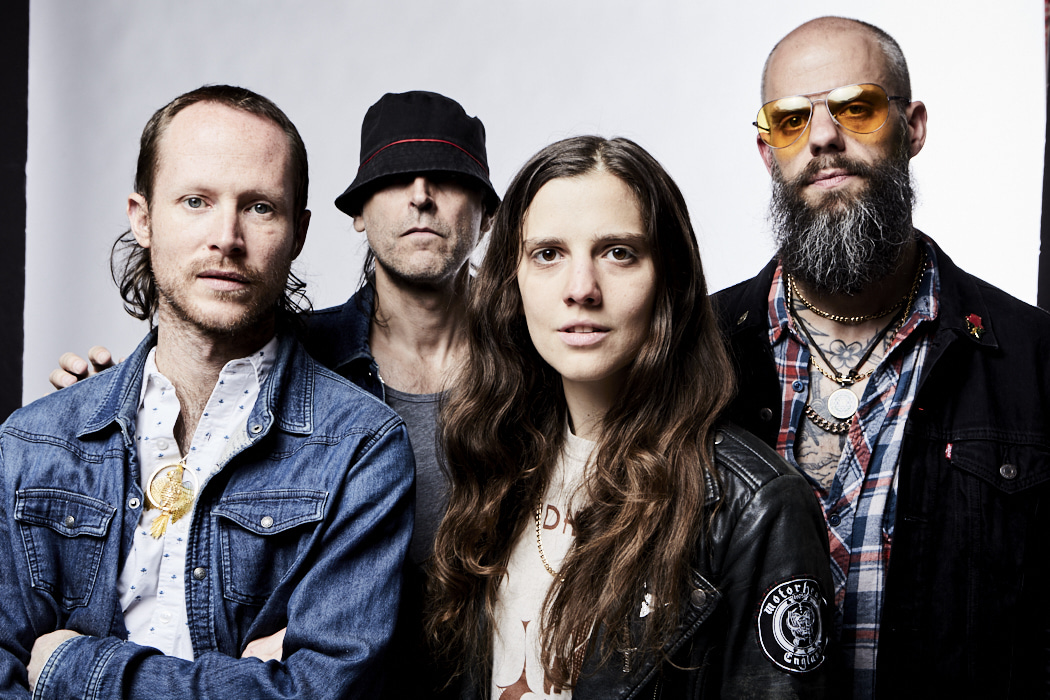American Aquarium roll with the changes
B.J. Barham talks his new band and his new outlook on American divisions.
When things changed for American Aquarium’s B.J. Barham — he found himself without a band and uninspired — he packed up his things and traversed America with his wife at his side. He visited every continental state, but more importantly, he talked to the people.
He’s a dad now. He has an entirely new band now, which reinvigorated his creative process. And he learned a lot about himself and found new inspiration in both America’s geographical and political landscapes.
Things Change is an important record in 2018 because, as America finds itself at its most divisive, it’s important for people outside of the South to hear people with Barham’s deep North Carolina drawl say the things that he says. It’s a record that has already found itself on many mid-year lists, including Rolling Stone Country’s Top 25 Records of the Year So Far. It’s Barham’s eighth studio record under the American Aquarium moniker, and it’s been hailed as the best of the bunch.
Before bringing the new band to Birmingham, he spoke with Jefferson County Journal about fatherhood, the new band, Trump’s America, and the state of country music.
Jefferson County Journal: You’ve become a dad since the last time we spoke. How has it changed you?
B.J. Barham: A dad. It’s weird. It’s something that I never wanted in my 20s and now that I have it, it’s my favorite thing in the entire world.
Jefferson County Journal: Did you ever think you’d settle down?
Barham: I never thought I’d be that responsible, and I [still] don’t think I am. My wife is doing the heavy lifting on responsibility. Over the last couple of years, it’s been fun to become the antithesis of everything that I wanted to be in my 20s.
Jefferson County Journal: This is an entirely new band for this record. How do you choose to release an album under the American Aquarium name versus your own name?
Barham: It’s kind of ironic — American Aquarium has always been an extremely autobiographical vessel for my songwriting. Everything I write [for American Aquarium] is extremely personal. It’s raw. It’s honest. It’s emotional. I did the B.J. Barham side project — the solo project — and it was all fictional, narrative songs. A lot of people get confused because the B.J. Barham stuff is all just made-up stories that have my name on them, and then everything that pertains to me and have my observations and are the way I feel about things have the American Aquarium moniker on them.
I try to distinguish that for people and tell them, “If you want to hear about my personal life, it’s the American Aquarium record, but if you want to hear this rolling, fictional narrative — folky songs — that’s what the B.J. Barham stuff was.
Jefferson County Journal: This time when you changed the band lineup, you made an especially pronounced public announcement. Why did you feel like that was necessary this time? What made this one different than past lineup changes?
Barham: When I think of the band situation over the past 12 years, “tumultuous” is a word that comes to mind. Since 2006, I’ve had over 30 members in this band. I’ve never made a record back-to-back with the same exact band. There’s always been at least one or two people leaving, one or two people coming in. This was the first time that there was a mass exodus. It was the first time there was a huge — almost a mutiny — where everybody kind of quit.
So I felt like I needed to make a public statement. If you just show up [to a performance] and you’re introducing [band members] and you just say, “Oh, here’s the keyboard player. Here’s his name,” you can gloss over that and slide it in without too many people paying attention. But when your hardcore fan base that has been supporting you for a decade-plus hears that the entire band that they fell in love with isn’t there anymore, there’s going to be questions. There’s going to be concerns. There’s going to be a little bit of scrutiny. There’s going to be a lot of doubt.
So I felt like I had to be up-front with the people that allow me to do what I want to do for a living. Once the boys quit, I wanted to be as transparent as possible. And I think anyone that has seen us since the new band formed — they don’t have any of that doubt anymore. There’s none of that scrutiny. The closest thing I can equate it to is when you’ve been coming home to the family reunion every year with that same girl you were dating in high school and everybody fell in love with her, then you show up the year you go to college with the crazy girl. And your grandma says, “Well whatever happened to that nice girl? I liked her. She was nice. She’s been here for seven years.” And you have to say, “Grandma, you may have liked her, but she wasn’t good for me. She wasn’t the best thing for me.”
Now I think anyone that has seen this band realizes that without question, this is the version of American Aquarium that’s going to stick for a while. This band is great. And don’t get me wrong, the last band was fun. We conquered a lot of milestones together. But just like any relationship, you start on the same page and then you grow as people. And when you grow as people, sometimes that means you grow apart as people. It’s just life. It’s how relationships work.
Toward the end of that relationship — 2016 or 2017 — it was a creative wasteland for me. The last songs that I wrote before I wrote Things Change were [for the solo album] Rockingham, which were written in the fall of 2015. For someone that comes out and calls himself a songwriter in public every day, going two years without writing a song caused a lot of self-doubt. It caused a lot of turmoil.
When the boys left, I thought, “Maybe I shouldn’t do this anymore. Maybe I need to reassess what I’m doing with my life.” Once I got acquainted with these new guys, once I got reinvigorated and became excited about music again, it was like someone walked over to a water spigot and turned it on and I wrote a record in two months. And as far as I’m concerned — as far as concise group of songs goes — it’s hands-down the best record that American Aquarium has put out. I think a lot of longtime fans and a lot of new fans agree with me.
Jefferson County Journal: During those two years, you did the ‘Great 48 Tour.’ You played a show in every state in the continental U.S., and you visited our national parks throughout. It was partially inspired by your wanting to understand people and why they voted for Donald Trump. What did you learn on that tour?
Barham: A lot of people thought the ‘Great 48’ was my Hail Mary throw after the band quit. But the funny thing is, the ‘Great 48’ was booked well before the band quit. It was supposed to be just me going out and seeing the country with my wife before we decided to settle down and have kids.
We booked it in probably September or October. After the election actually happened, it became a good thing for me to just talk to people. It created dialogue. I’m from the South. I’m a progressive Southerner, but I’m still from the South. Being from the South, I’ve learned that just because people voted for that man, I don’t believe they’re bigoted, misogynistic hatemongers. There’s good people out there that just got put in a tight spot and they felt like this wild card was the way to get out of it. Talking to people, I realize that’s exactly what it was.
Don’t get me wrong — there’s still a subset of his constituents that voted because of their hate for minorities or taking away women’s rights or then there’s the Christian-base — and talk about Hail Marys, talk about desperation—the Christian-base put their faith in that man. It was a hard time for the Republican Party, and they took a chance on a wild card. And it paid off for them in the short term, but I think in the long term, it only did damage to the party.
But for average Joe — the guy that is out there working 50 hours a week to take care of his family — they’re not hateful people. They’re good people at heart. I grew up with those people; I went to school with those people. I play songs for those people every single night.
At first I was angry. I was really mad that our country let this happen. But then that anger turned to compassion once that ‘Great 48 Tour’ started. I started realizing that people didn’t vote for a lot of the reasons that news outlets are trying to say they voted. Good people were desperate and they made that decision. And now we’ve got to work together; it takes open dialogue. To heal the fracture that this election caused our country, it’s going to take open dialogue. It’s going to take focusing on the stuff that we have in common rather than the stuff that we don’t.
Jefferson County Journal: You’ve said that on that tour, you found some of the reddest states and areas of the country weren’t even in the South.
Barham: Yeah, everyone wants to talk about Mississippi and Alabama and South Carolina — the Deep South — but people forget about Texas. People forget about Oklahoma. People forget about that Bible Belt — that Midwest, corn-fed Bible Belt. And that’s a huge part of the country. As progressives, we like to focus on the east and west coasts, and we tend to forget that there’s a lot of people between the coasts. And a lot of times, those are just hard-working, blue-collar Americans that are trying to do the best they can for their families.
There’s a lot of elitists in our party that only focus on New York and Philly and D.C. and Los Angeles and Seattle. That’s not what makes up the majority of our country; for us to have open dialogue, people on the coasts are going to have to start having compassion and showing a willingness to listen to the people in the Midwest.
On Things Change‘s opening track, “The World Is on Fire,” you talk about how folks are afraid. Have you figured out why?
Barham: Everybody is afraid. Liberals. Republicans. We’re all afraid. Everybody is afraid of change. There’s two reactions after every election. You get to poke your chest out and scream about how your side won and “Change is a-coming!” or you’re cowering in a corner talking about how the world is going to come to an end.
We’ve been conditioned to think the other side is the devil. If the Republicans win — [or] if the Democrats win — the world is going to go to hell in a hand basket. What I think people forget is the resolve of this country. America hasn’t gone anywhere. We’ve had a shift in power since it began. There’ve only been four elections in our country where a different Republican won an election or a Democrat won after a Democrat. It’s always been a flip-flop. It’s always been a balance of power. And that’s the thing that makes this country beautiful; no one side stays in power that long without being checked by the other side. That’s a really great thing. The American people aren’t going to let this thing fall apart. Yeah, we got ourselves into this situation, but I think the resolve of this country is what’s going to get us out of it.
Jefferson County Journal: You have a song on the record called “I Gave Up the Drinking (Before She Gave Up on Me)” that is definitely a country song. Why is there a stigma around the community you’re part of about calling a country song a country song?
Barham: Country music gets a bad rap because of what is presented today as country music. Country music has been around way before my dad — before me — and it’ll be here way after me. I’m sure it will have many more different looks and phases. But country music for me has a different meaning than what I think it means to the average radio listener. Country music for me is just normal individuals who make observations on the world around them and write as honestly and openly about them as they can with real instruments — real guitars and fiddles and pianos and pedal steel and drums — that’s what makes country music to me.
It’s not necessarily the twang; it’s about the subject matter. It’s about writing about your everyday life and the everyday life of people around you. A lot of people talk about how country music is dead or country music needs saving. No, it doesn’t. You’re just looking in the wrong place. You’re not going to find real country music on the radio these days unless someone like [Chris] Stapleton comes along every 10 years and re-injects a little faith into the outsiders who’ll say, “Listen, this is what we started as, let’s get back to center.”
I think they throw folks like Stapleton in just to get us back to that center because it starts veering so far in the wrong direction. But there’s plenty of great country music: Tyler Childers, Jason Isbell, Drive-By Truckers, Lucero. No matter what style or what music you like, there’s real country music being played around the country on any night of the week in any town you’re in, probably. You’ve just got to go out and find it. And I like to consider us part of the group that is real country music that people are going to have to find.
Jefferson County Journal: When you visited Birmingham on the ‘Great 48 Tour,’ you revealed that you have a deep love and appreciation for country music — specifically, for country music in this very specific time period between about 1988 and 1995. Who were your top five country artists from that time frame?
Barham: My love for that music doesn’t come from the actual music; my love for that era comes from the memories from that time when that music was playing as a soundtrack. Hanging out with my dad on road trips; riding to school with mom and listening to country radio.
Travis Tritt. Randy Travis is way up there. George Strait is up there. Alabama is another one of my favorites. And I’d say Dwight Yoakam. Dwight Yoakam was that era’s Chris Stapleton; they threw a real country artist in to remind us where we came from, and it took a kid from California to remind a North Carolina kid what country music really was.
Those would be my top five. I still listen to them today on road trips. Those are the five I always put on. But the ‘80s marked a really interesting time in country music, because it’s the time when we really had a split between entertainers and artists. If you notice, that split came when music videos became a thing. When you could actually see the person singing your song, it started to matter what those people looked like.
The record labels started focusing on how people looked in jeans and a cowboy hat. You’ve got to have a strong jawline to be a country singer nowadays, and I don’t have that jawline. Before country music videos, your country singers were ugly as sin. You had Willie Nelson. You had Waylon Jennings. You had Merle Haggard; who wrote their songs and sang their songs and played their songs. And they were ugly. But nobody cared what they looked like as long as they sounded good and sang songs that meant something. But once you started seeing music videos, you noticed that real country music started dying and entertainers started popping up.
American Aquarium comes to Saturn on Friday, June 29. Travis Meadows opens. Doors are at 8 p.m. and the show begins at 9 p.m. Tickets are $15. For more information, visit saturnbirmingham.com.
Blake is a freelance writer. His work has been published at AL.com, Birmingham Post-Herald, Birmingham News, Weld: Birmingham's Newspaper, Birmingham Magazine, Good Grit, Leeds Tribune and Over the Mountain Journal among many others. Blake has served The Literacy Council of Central Alabama, where he was a past chair. He also served Alzheimer’s of Central Alabama and the Alabama Symphony Orchestra. He is a proud alumnus of Auburn University and was raised in Rogersville, Alabama, but he currently resides in Birmingham. Follow him @blakeells.








